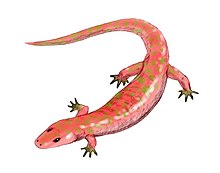Allocaudates
| Albanerpetontidae Temporal range: Bathonian–Piacenzian |
|
|---|---|
 |
|
| Life restoration of Albanerpeton | |
| Scientific classification | |
| Kingdom: | Animalia |
| Phylum: | Chordata |
| Class: | Amphibia |
| Order: | †Allocaudata |
| Family: |
†Albanerpetontidae Fox and Naylor, 1982 |
| Genera | |
The Albanerpetontidae are an extinct family of superficially salamander-like batrachians. Albanerpetontids include four genera – Albanerpeton, Anoualerpeton, Celtedens, and Wesserpeton – and between 10 and 20 known species, spanning about 160 million years from the Bathonian stage of the Middle Jurassic to the end of the Pliocene, about 2.5 million years ago. Albanerpetontids were long thought to be salamanders because of their small size and generalized body plans. However, these features are now thought to be ancestral for lissamphibians and not indicative of close relationships between the two groups. One of the things that made them different from salamanders was that their skin was covered with bony scales. Albanerpetontids are now recognized as a distinct clade of lissamphibians separate from the three living orders of amphibians – Anura (frogs), Caudata (salamanders), and Gymnophiona (caecilians). Some studies show them as more closely related to frogs and salamanders than to caecilians, while others show them to be outside of the lissamphibian crown-group.
Compiled from Paleofile.com and Mikko Haramo's websites.
...
Wikipedia
